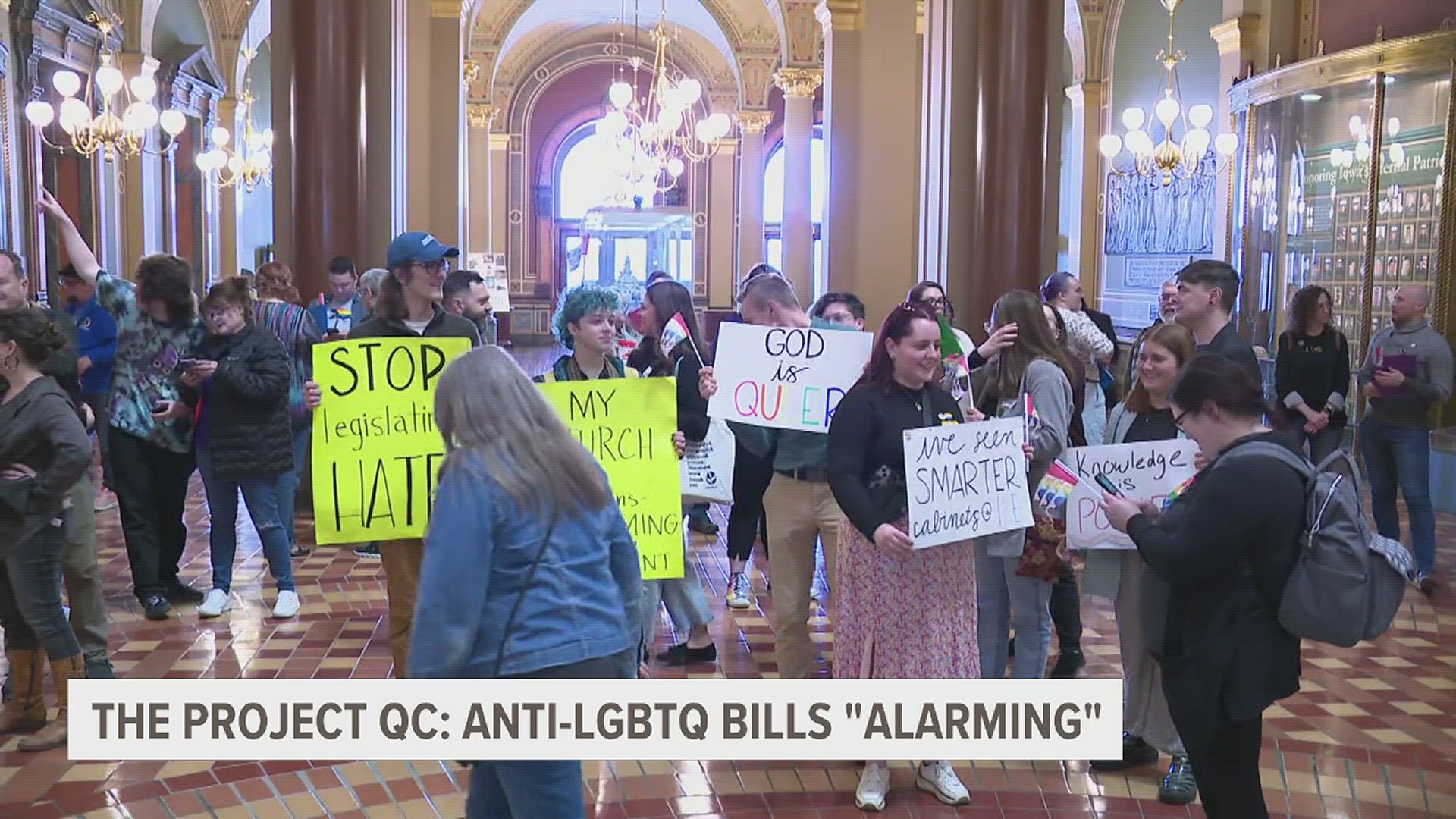MOLINE, Ill. — Tyler Mitchell has lived in Iowa all his life. He works as the marketing and communications manager for The Project of the Quad Cities, a nonprofit that helps provide healthcare services to people in the LGBTQ community. He's a member of the community himself.
"I truly believe that in this moment, our work is more important than ever as these bills continue to come down the line and challenge and make the lives of LGBTQ Iowans far more difficult," Mitchell said. "I've always felt safe in my state, and I continue to still feel safe, but there are other people in my community that are far more vulnerable that are really starting to feel like their state is not open to them. It does not welcome them."
Nonprofit One Iowa Action tracks bills that it considers to be anti-LGBTQ. It says it means the bill "either directly impacts LGBTQ Iowans, will have a primary impact on LGBTQ Iowans or was created as a response to misinformation about LGBTQ Iowans."
According to the nonprofit, 14 new bills have been introduced in Iowa in 2024 that it considers anti-LGBTQ. In 2023, there were 29 introduced and four that were ultimately signed into law by Gov. Kim Reynolds. One of those is a law that bans all forms of gender-affirming care up to age 18.
"It's an alarming trend that just seems to be continuing," Mitchell said.
On Jan. 31, a bill that would have stripped gender identity from the state's civil rights law was rejected by three members of a House Judiciary subcommittee.
However, this week HSB 649 passed through an education committee, making it now eligible for a vote on the House floor. That bill, now renamed HF 2389, strictly defines terms such as "man," "woman" and "sex" to correlate solely with one's sex assigned at birth. Using those definitions, the bill stipulates that transgender Iowans could only use state facilities that correlate with their biological sex.
The bill also requires a transgender person's sex at birth be listed on their birth certificate, as well as their gender identity after transitioning. Under current law, both don't have to be listed.
The bill was introduced by Gov. Kim Reynolds.
Before advancing the bill, the House Education Committee on Tuesday did vote to remove language from Reynolds' original bill that would require both gender markers on driver's licenses. That means someone who has undergone gender-affirming surgery could apply for a new driver's license and it would only reflect their gender identity.
Supporters of the bill say it would ensure the safety of biological females in prisons, domestic violence shelters and restrooms.
Mitchell was in Des Moines on Monday to advocate to lawmakers and raise concerns about these bills.
"Transgender people in the state of Iowa represent less than 1% of the entire population, right?" he said. "Yet we have a legislature that seems really inclined to continue making laws that regulate their lives and their bodies and what they choose to do with them... We really need to begin to ask ourselves, even if these bills are technically only impacting less than 1% of the population, what are we saying to other people, both in our state and outside of our state?"
Mitchell said some people spoke at the capitol about wanting to leave Iowa because they feel unsafe.
"Imagine all the ways in which not feeling safe can impact your life, right?" he said. "You might be less likely to leave your house, you might be more likely to feel depressed, more likely to feel anxious, right. So again, even the awareness of these bills, it makes LGBTQ Iowans, in particular, trans Iowans, feel like there's a target on their back."
For him, it's about giving people the freedom to choose how to live their lives.
"If a choice that person is making, unless it is like actually harming another human being in some way, if the choice I'm making is harming another person, maybe there's cause for concern, but otherwise, these are decisions that people are making about their own lives, their own bodies, and I just think that we should treat people with a little bit more grace and understanding," Mitchell said. "I would like to think that the majority of constituents care about like clean water and the quality of their education or the amount of taxes that they're paying. So I as an Iowa citizen, would encourage legislators to focus on that."
HF 2389 has not been scheduled for a House floor vote yet. A public hearing is scheduled for Monday, Feb. 12 at 5 p.m.
The Project is hosting a community open house for people interested in learning more about its services on Monday, Feb. 12. It's from 4:30-6:30 p.m. at its location in Moline at 4101 John Deere Rd.

